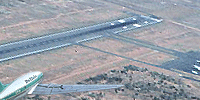 |
 |
|
||||
|
By
Wikipedia, Aerocapture is a technique used to reduce velocity of a spacecraft, arriving at a celestial body with a hyperbolic trajectory, in order to bring it in an orbit with an eccentricity of less than 1. It uses the drag created by the atmosphere of the celestial body to decelerate. Only one pass in the atmosphere is required by this technique, in contrast with aerobraking. However, this approach requires significant thermal protection and precision closed-loop guidance during the maneuver. This level of control authority requires either the production of significant lift, or relatively large attitude control thrusters. In practiceAerocapture has not yet been tried on a planetary mission, but the re-entry skip by Zond 6 and Zond 7 upon lunar return were aerocapture maneuvers, since they turned a hyperbolic orbit into an elliptical orbit. On these missions, since there was no attempt to raise the perigee after the aerocapture, the resulting orbit still intersected the atmosphere, and re-entry occurred at the next perigee. In fictionAerocapture within fiction can be read in Arthur C. Clarke's novel 2010: Odyssey Two, in which two spacecraft (one Russian, one Chinese) both use aerocapture in Jupiter's atmosphere to shed their excess velocity and position themselves for exploring Jupiter's satellites. This can be seen as a special effect in the movie version (created by MGM/released by Warner Home Video) in which only a Russian spacecraft undergoes aerocapture (in the film incorrectly called aerobraking), which is demonstrated via special effects. See also
Text from Wikipedia is available under the Creative Commons Attribution/Share-Alike License; additional terms may apply.
Published in July 2009. Click here to read more articles related to aviation and space!
|

 |
|
Copyright 2004-2025 © by Airports-Worldwide.com, Vyshenskoho st. 36, Lviv 79010, Ukraine Legal Disclaimer |